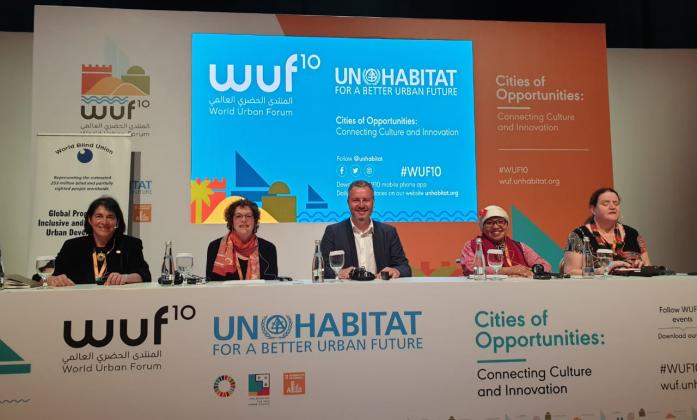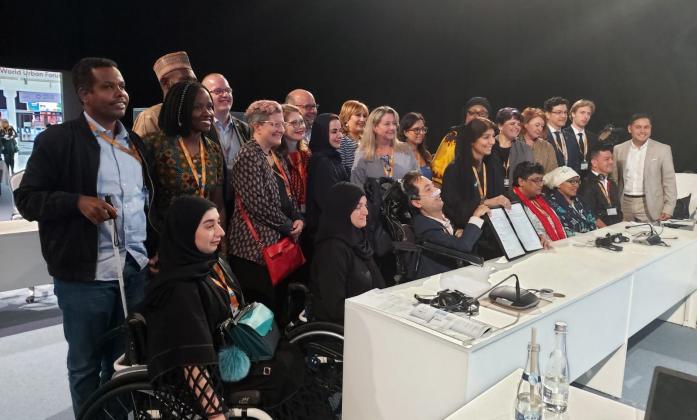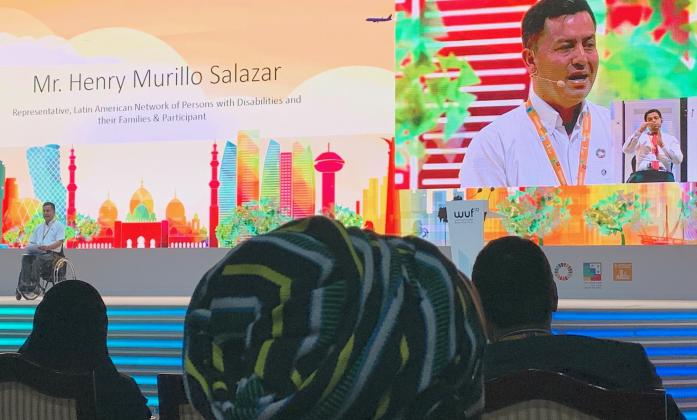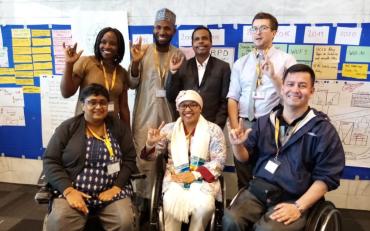Abu Dhabi, 8-13 February 2020
Read the full report here (an MS Word version will download)
The tenth session of the World Urban Forum took place from 8 to 13 Feb 2020. Attending the Forum include IDA members’ representatives and Bridge CRPD-SDGs Alumni who are part of the delegation of persons with disabilities coordinated by the World Blind Union (WBU) with financial and technical support from CBM, and technical support from the International Disability Alliance (IDA) and its other members, in particular, the African Disability Forum, RIADIS, Inclusion International and WNUSP as well as the supported organization TCI Asia-Pacific. Through the "No One Left Behind Grant" (Disability Catalyst Programme, DFID), and the Bilateral Associate experts’ programme (Sida), WBU took a leading role in advancing the rights of persons with disabilities across the New Urban Agenda.
The WBU is now the co-chair of the General Assembly of Partners - Partner Constituency Group of persons with disabilities (GAP-PCG) which is the recognized stakeholder mechanism to the New Urban Agenda and by UN-Habitat.
The Bridge Alumni and fellows from IDA members from different regions including Africa, Asia, the Pacific and Latin America also representing various disability constituents, including blind people, people with intellectual disabilities, people with psychosocial disabilities, people with physical disabilities, and Deaf people are participating in several events including roundtables, dialogue sessions, side events, and also a training event. The training event organized by World Blind Union (WBU) had the Bridge Alumni working together with their counterparts from WBU and CBM to deliver a training on Cities celebrating Diversity: Effective engagement of persons with disabilities in New Urban Agenda implementation.
On the 6th and 7th, the delegates participated in a pre-conference training. This was critical as it also exposed the Alumni to new knowledge to support their meaningful engagement and delivery of messages in all the events they attended. The pre-training introduced the Alumni to inclusive and accessible urban development; how to engage in the New Urban Agenda process and also conversations around the World Urban Forum theme on culture and innovation which was key to develop messaging by the delegates.There was also an introduction to the Age Friendly Cities Initiative to support the delegates to get familiar with discussing intersectionality in relation with urban development and learn about age-friendly cities initiatives including practices and tools for accessibility and universal design.
Throughout the week the Alumni have participated as speakers in panels and roundtables and also made various interventions in sessions. They have also made both individual and organizational commitments on how to promote the full and effective participation and inclusion of persons with disabilities in the New Urban Agenda – Abu Dhabi Declared Actions.

In the official closing ceremony, a Bridge Alumni from Latin America made remarks calling the attention of the world that the future must be accessible to all. His remarks, one of the only one from civil society organisations made a key summary of the messaging that had been done by the delegates in the course of the week. This included the need to have universal design standards on streets and public transport design and to also ensure the involvement of all persons with disabilities in urban development.

Testimonies
Risna Utami, CRPD Committee Member, Indonesia
“I am happy to be part of the delegation of persons with disabilities and also a Bridge Alumni. There has been much learning and sharing on the CRPD, the SDGs and the New Urban Agenda which has been both beneficial for me, and also the many people we interacted with. Training other persons with disabilities and other stakeholders such as urban planners, architects, government stakeholders, and other institutions and organizations in terms of accessibility and universal design are key for me going forward as they are key elements in terms of implementing the new urban agenda.
In addition, as delegates with disabilities it has been a fruitful experience to network and connect with many other delegates; to also connect our work into reality as we advocate for the New Urban Agenda, as well as accessibility and universal design on the ground because we need to have more community practices.
With the Bridge training I appreciate that I have accumulated skills and opportunities to train other people; to influence them on the intersection of the SDGs, CRPD and the NUA which is two different global UN outcomes, and the human rights tool which is the CRPD. Through the Bridge training, I can see the strong connections, and also how to connect the human rights approach with urban development.
It is crucial to mention that our participation also models the importance of meaningful and effective engagement and participation of organisations of persons with disabilities, especially groups that are often excluded such as those with intellectual and psychosocial disabilities to be a part of these processes. We had a diversity of persons with disabilities to highlight barriers that underrepresented groups face in urban development and their participation is very essential and is the key on implementing the urban agenda to ensure accessible, resilient, safe and sustainable cities.”
Henry Murillo, RIADIS, Colombia
“Being a part of the World Urban Forum was an opportune moment to continuously remind all stakeholders that accessibility is a pre-condition to access human rights, and all persons including persons with disabilities should be able to access cities, as indeed according to the Forum theme, cities are places of opportunities. We will continuously need more people with disabilities to be involved in these spaces, so as to realise the implementation of the new urban agenda together and so get the reality that we want."

Sulayman Ujah, ADF, Nigeria
“It has been a great experience at the World Urban Forum. I made various interventions, in roundtables and also in the side events where for example I made contribution on the inclusion of persons with disabilities in situations of risk and humanitarian emergencies and why it is very critical to have their voices, as equals, not as beneficiaries. The Bridge training has played a huge part in exposing me to new knowledge which also strengthened my contributions during the Forum. This advocacy is something I will take back to the Bridge networks so as to work together to engage relevant partners in urban planning on ensuring our inclusion.”
Jane Akinyi, Inclusion International, Kenya
“It has been great to be a part of the World Urban Forum, and as a Bridge Alumni, I will endeavor to pass my knowledge to other self-advocates. Participating in the forum has also been important as it has been an opportunity to strengthen our skills as persons with disabilities. I look forward to passing my experiences and learnings to others in my organization.
I am grateful for the opportunity to amplify the voices of persons with intellectual disabilities while at the Forum; therefore, ensuring a meaningful seat at the table and speaking about inclusive, accessible cities. I made linkages that I will follow up especially on inclusive transportation in Kenya.”
Elizabeth Ombati, WNUSP, Kenya
“Participating in the World Urban Forum has been eye-opening and an opportunity not only to highlight barriers faced by persons with disabilities from underrepresented groups in urban development; but it was an opportunity to also build solidarity in the cross-disability movement and together advocate for the inclusion of all voices of persons with disabilities in the New Urban Agenda.
As a Bridge Alumni, this has been one of the greatest learnings, the power of solidarity and working together to make change. Going forward, and with commitments made in the Forum, is to work also more intentionally on ensuring that other Bridge Alumni are benefitting from the knowledge we have gained so far, but also working to build a model where Bridge Alumni are continuously exposed to such global events to strengthen their global advocacy. As a journalist, I continue to do my advocacy using my blog and this week has been an opportune moment to write about my city and question the commitment to ensure it is inclusive and accessible. Link. https://bit.ly/2UMrBJd”
Alradi Abdalla, Sudan
“I am happy about the dialogues happening between different stakeholders and am happy that the group of persons with disabilities is here to reinforce discussions around engagement of persons with disabilities. I see the Bridge Initiative in action, throughout the week, in different ways, bridging between different constituencies of persons with disabilities who are represented in the delegation and also connecting people from regions around the globe.
I benefitted from Bridge and can say that the training session we held, there is a lot of benefit from the capacity building we all received from Bridge in articulating messages not only in the training event but also in other events that we attended.
I take this week as a learning and exposure process on how to do advocacy at the global level by persons with disabilities from various constituencies which brings richness and depth to contributions. Therefore, as a way forward, the engagement this week can used as a model in terms of shaping delegations of persons with disabilities from diverse constituencies to engage in global advocacy.”
Shivani Gupta, TCI Asia-Pacific, India
“It was the first time I participated in the World Urban Forum and it has been insightful to deepen my knowledge around the New Urban Agenda. I am happy to have the new knowledge which was key in making interventions in various sessions.
The new urban agenda is a way of implementing the CRPD, and it is really critical for many other persons with disabilities through their organisations to deepen their understanding on the urban agenda. Going forward, it will be critical to strengthen the networks of Bridge Alumni and strategize on a way that more of us have this knowledge and are able to meaningfully work with stakeholders in our cities to realise the new urban agenda."
Hannes Lagrelius, World Blind Union
“The realization to ensure an effective engagement of persons with disabilities in the World Urban Forum has been a long process made successful by the contributions of many partners since the World Blind Union started engaging around the New Urban Agenda in 2019. During the week, our delegation has conducted brilliant events in the official program of this Global forum as well as have had key roles in various sessions ranging from mobility, transport and ICT.
We co-hosted the official roundtable on persons with disabilities and did not only secure commitments of various cities to inclusion and accessibility but were also able as a delegation to deliver key commitments and declare our actions on accessibility and inclusion in urban development.
The week in Abu Dhabi has been one of the most hectic, intense and fun experiences I have had in recent years. It is the first time a delegation of persons with disabilities is led by a global DPO to a global forum on urban development. By working as a team we were able to not only take part and speak in official sessions on various themes, promoting accessibility and disability inclusion in urban development, but also that we were able to promote CRPD compliance of the outcome document of the whole forum. Additionally, our voluntary commitments and some of our declared actions were selected by UN-Habitat to be fitted in the annex of the outcome document.
For me, this means that we are claiming the space as a movement but also it shows that we are increasingly recognized as a united voice in the promotion of accessibility, universal design and inclusion in urban transformation.”
Benjamin Dard, CBM
“The week at World Urban Forum has been one of the most powerful and impactful adventure towards inclusion. For the first time at the World Urban Forum we had a diverse, confident and expert group of persons with disabilities from different regions who have made a lot of impact to the Forum including influencing on the final outcome document.
The Bridge training has been a game changer, as the level of expertise is exceptional and also the levels of intervention made by the delegates in different events worked to ensuring that we are creating spaces where there are no barriers for anyone to participate.
It was monumental both for me and for many others to engage with all delegates, speaking for themselves as persons with disabilities and changing mindsets and attitudes as regards how city planners and other stakeholders engage and involve persons with disabilities.
Going forward will be to agree on commitments to take forward as far as engagement with various stakeholders is concerned and ensuring that everyone is building the links toward the new urban agenda also recognizing that the new urban agenda is a reinforcing tool for the implementation of the CRPD. Now more than ever and in discussions around safe, resilient, sustainable and inclusive urban spaces, there is an opportunity for much more dialogues thanks to the work that is ongoing on engaging diverse groups of persons with disabilities.”

